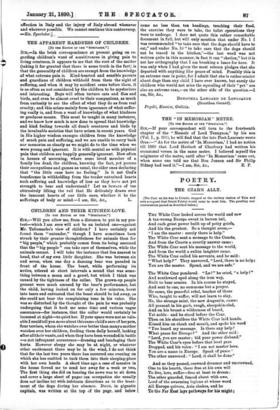THE APPARENT HARDNESS OF CHILDREN.
[To THE EDITOR Or THE "SPECTATOR:'] SIR,—In the brisk correspondence at present going on re- garding children's want of sensitiveness in giving pain to living creatures, it appears to me that the root of the matter (taking it for granted that there is some truth in the fact) is that the generality of children are exempt from the knowledge of what extreme pain is. Kind-hearted and sensible parents and guardians of children withhold from them the sight of suffering, and when it may by accident come before them, it is as often as not considered by the children to be mysterious and interesting. Boys will often torture cats and flies and birds, and even be almost cruel to their companions, as much from curiosity to see the effect of what they do as from real cruelty; and this arises mainly from ignorance of what suffer- ing really is, and from a want of knowledge of what kindness or goodness means. This must be taught in many instances, and we know how much is now done to spread that knowledge and kind feeling towards all dumb creatures and birds by the invaluable societies that have arisen in recent years. God in His higher wisdom exempts children from the knowledge of much pain and suffering, and we are unable to carry back our memories as clearly as we might do to the time when we were young and ignorant. It is with mental as with physical pain that children are happily generally ignorant. How often in houses of mourning, where some loved member of a family lies dead, the children, knowing the fact, yet pursue their occupations and games as usual, the elder ones declaring that "the little ones have no feeling." Is it not God's beneficence in withholding from the tender untrained hearts such suffering and knowledge of loss as they have not yet strength to bear and understand ? Let us beware of too obtrusively lifting the veil that He delicately draws over the innocent hearts of our little ones, whether it be the
sufferings of body or mind.—I am, Sir, &a., L.


































 Previous page
Previous page